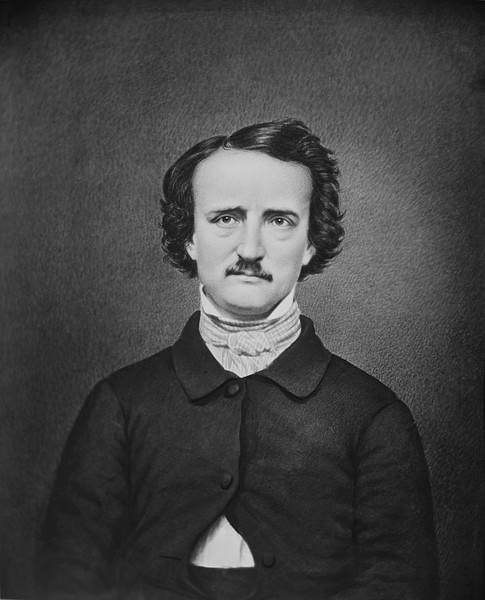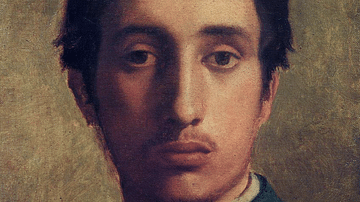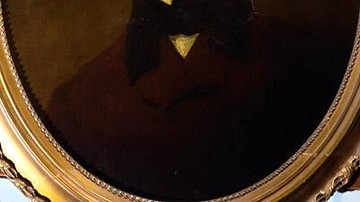
Edgar Allan Poe (1809-1849) was an American author and poet, often credited as the father of the short story, a pioneer of science fiction, the inventor of the detective story, and the master of the horror genre. He is best known for his poems The Raven, Annabel Lee, and Helen, the short stories The Fall of the House of Usher, The Cask of Amontillado, and The Masque of Red Death; and the detective story The Purloined Letter.
Poe was one of the most influential writers in his own time as well as generations later. Robert Mead in his Literature of the American Nation wrote that Poe's stories, poems and essays, "convey the conviction of intensity felt experience, the authority of extraordinary intelligence. That was Poe's genius" (71). One of his best themes is the difficulty of establishing a discrete limit between the living and the dead, the exploration of the border between things that one may wish to remain separate: life from death, the human from the animal, and the real from the imaginary.
Although Poe was a brilliant writer, his life was one of poverty and misery, and his short stories and poems reflect the deep sense of loss Poe experienced throughout his life. Charlotte Montagne in her book on Poe called him a giant of American literature "but his life was a disaster, a tale of unremitting misery, constant poverty and repented frustration and disappointment" (Intro). He was the first American writer to try to support his family through his writing. Unfortunately, he failed. While he may have lived in poverty, he changed American literature forever. Despite his tragic death at the age of 40, he left behind over 70 macabre stories, poems, and one novel "filled with suspense and brilliantly twisted plots." (Montagne, Intro)
Early Life
Edgar Allan Poe was born on 19 January 1809 in a boarding house near the Boston Commons in Boston, Massachusetts. Mead wrote that, from the beginning, his life seemed destined for destruction. Both of his parents were actors, not a respectable occupation at the time. His father, David Poe, Jr. (1784-1811) was a member of the Boston Thespian Group. He proved to be a major disappointment to his parents, who wanted him to become a lawyer. He and Elizabeth (Eliza) Arnold Hopkins, an expatriate English actress, met in Norfolk, Virginia, and were soon married. She was a widow. Her husband Charles Hopkins had died six months earlier. Poe's brother William Henry was born nine months later in 1807; he would die in 1831 of tuberculosis.
David and Eliza traveled the theater circuit up and down the East Coast leaving young Poe and his sister Rosalie (1810-1874) with David's parents David Sr. and Elizabeth in Baltimore. By 1811, David had abandoned his family. Never getting any respect for his acting ability, his stage career had stalled owing to his heavy drinking. He died in December of 1811 in Norfolk. Considered a talented actress by most reviewers, Eliza became ill with tuberculosis and died at the age of 24 on 8 December 1811. The young couple died within three days of each other.
Although he was only two years old, with little memory of his father, many believe Poe inherited his father's character and bad habits. Since his grandparents were financially unable to care for Poe and his little sister, Rosalie was adopted by the Richmond merchant William Mackenzie. Although never formally adopted, Poe was taken in by John Allan, a tobacco merchant and his wife Frances. Poe was given Allan as his middle name. John was said to be impulsive and quick-tempered, but Poe wanted for nothing. He was encouraged and given opportunities to indulge in his literary pursuits. He had the unique ability at a young age to memorize and recite long passages of poetry.
Poe in London
In 1815, with the War of 1812 against Great Britain finally over, at the age of six, Poe and the Allan family left Richmond, initially stayed with John's family in Scotland, and then settled in Liverpool, England, where Allan hoped to open a branch office. While there, Poe was exposed to a wide range of cultural and economic opportunities. In London, he was enrolled in a boarding school on Sloane Street, and later, at the age of nine, he studied at the Manor House of Reverend John Bransby. Many of the people Poe met in London would later become characters in his short stories.
On 20 June 1820, with Frances having taken ill and Allan's branch office hopes dashed, the Allans sailed to New York and then went back to Richmond. In the fall of 1820, Poe studied under Joseph Clarke, who taught him mathematics and exposed him to the great writers of classical literature. Clark also recognized Poe's gift for poetry and encouraged it. At the age of 14, he studied under William Burke who taught him Latin, French, and Italian, as well as geography and grammar.
Although he would soon receive a sizeable inheritance, Allan's business ran into difficulty due to the Panic of 1819; he would recover and die as a very rich man on 27 March 1834, leaving Poe nothing. Poe's relationship with Allan had become strained; Allan considered Poe's poetry to be good but did not encourage him. In February 1825, Poe entered the newly-opened University of Virginia, enrolling in two classes: Ancient Languages and Modern Languages, but Poe's gambling caused problems and Allan refused to pay his debts. Allan also refused to support Poe financially, and according to Mackenzie, he exhibited cruelty towards Poe. Poe was forced to leave the university and return to Richmond to work in Allan's finance department.
Poe in the Army
Despite these hardships, Poe continued to write poetry, and in July 1827, Tamerlane and Other Poems was published under the pseudonym "a Bostonian." Some speculate that he published it anonymously to avoid creditors. Unemployed, he enlisted in the army under an assumed name Edgar A. Perry and was ordered to report to Fort Independence in Boston Harbor as a company clerk. He was later transferred to Fort Moultrie in Charleston Harbor. Throughout his short stint in the army, he continued to write, revise, and publish many of his poems, often using his brother's name. One such poem appeared in the 2 November 1827 issue of North American Magazine.
By the end of 1829, he had published Al Aaraaf, Tamerlane, and Minor Poems under his own name. In the meantime, he was trying to get out of the army, appealing to Allan for help. On 1 January 1829, he was promoted to regimental sergeant major. Finally, with Allan's help, he left the army on 1 April 1829. Again unemployed, Poe lived in Baltimore with his cousin, reading and writing. With little assistance from Allan, but positive support from others, on 20 June 1830, Poe enrolled at West Point even though he was over the age limit. While he excelled in French and mathematics, he was expelled on 6 March 1831 for failure to fulfill his duties: missed classes and roll calls. While he was thrilled with the decorum of rank and uniform, he felt restricted by the drills and regulations. He returned to Baltimore to live with his aunt Maria Clemm and her 9-year-old daughter Virginia.
Literary Success & Marriage
In January 1832, the Philadelphia Saturday Courier published his short story Metzengerstein. Bon-Bon (The Bargain Lost) followed, published in December 1832 in the Philadelphia Saturday Courier. The Baltimore Saturday Visiter published MS. Found in a Bottle in June 1833. Poe entered a productive period of writing between 1835 and 1837. He was assistant editor of Southern Literary Messenger and published Berenice and Morella. Poe wrote thousands of columns for only $15 a week. He had to move to Richmond for work, where he soon sank into a deep depression, leading him to drink, which caused him to get fired. He was promised his job back on the condition that he stop drinking. He did, and Maria and Virginia moved to Richmond to be with him. In May 1836, he married Virginia with her mother's permission – she was only 13. Virginia would become the model for many of the beautiful but ill and pale figures in his short stories, such as Madeline in The Fall of the House of Usher.
During the ten years of marriage, he moved the family to Philadelphia and lastly to New York City, all the while working as the editor of a number of magazines. It was a period of creativity, writing critiques, poems, and short stories. In 1838, he published his only novel The Narrative of Arthur Gordon Pym of Nantucket. In addition to his own writing, Poe corresponded with a number of authors of the day and served as a literary critic for various magazines. He wrote critiques of William Cullen Bryant, Henry Wadsworth Longfellow, Nathaniel Hawthorne, Washington Irving and even Charles Dickens.
In 1838, Ligeia appeared in The American Museum, and with it, Poe began to gain respect. In 1839, William Wilson was published in Burton's Gentleman's Magazine. It was the first of his works to be published in a foreign language, in the Paris newspaper La Quotidienne. The Fall of the House of Usher was also first published in 1839 in Burton's Gentleman's Magazine and then included in the two volumes of 24 stories published in Tales of the Grotesque and Arabesque in 1840. Reviews were initially harsh, but the New York Magazine and Philadelphia Saturday Courier were favorable.
In April 1841, Poe published The Murders in the Rue Morgue and hereby instituted a new genre: the detective story. It was called the most significant short story of the 19th century. He introduced a detective, C. Auguste Dupin, who would reappear in The Purloined Letter (1844) and The Story of Marie Roget (1842) – the latter was based on a true story. The Masque of the Red Death was published in Graham's Magazine the same year. The Tell-Tale Heart was published in The Pioneer in January 1843 while The Gold Bug was published in the Dollar Newspaper in June 1843. In 1844, Poe and his family were living in New York, where he wrote The Black Cat. Next came The Premature Burial, published in 1844 in the Dollar Newspaper.
The Raven brought him international notoriety. Ulalume and The Bells enhanced his fame further. The Raven was published across the country in the New York Tribune, Southern Literary Messenger, and Richmond Examiner; it was the most popular poem any American had ever written. Published in November of 1845, Poe dedicated The Raven and Other Poems to Elizabeth Browning.

Death
In January 1847, Virginia died. She had first shown signs of tuberculosis in 1843 and her health slowly declined. Poe continued to tour, reciting The Raven and giving lectures. But the death of Virginia affected his writing, and he wrote less and less. Despite rumor and conjecture, Poe did not die drunk in a Baltimore gutter. Instead he died in a Baltimore hospital. Returning from Richmond where he had visited an old girlfriend, the recently widowed Elmira Shelton, he arrived in Baltimore on 27 September 1849 and met with some friends at a local bar and began to drink. For almost six days no one saw him or knew where he was. One likelihood came from his cousin, who had been unable to locate Poe but thought he was probably suffering from hallucinations that had troubled him since Philadelphia.
On 3 October, he was found semiconscious outside an Irish tavern, Gunner's Hall. Word was sent to his friend Dr. Joseph Snodgrass, who found Poe dressed in clothes that were not his own. Unconscious, he was taken to Washington College Hospital and examined by Dr. John Moran. Given a bed, Poe suffered tremors; his hallucinations soon returned, lasting for two days. Dr. Moran reported Poe had suffered from delirium. Waking on 5 October, he was confused but soon became quiet, uttering “Lord help my poor soul” – his last words. He died at 5:00 a.m. Sunday, 7 October 1849. He was 40 years old. With few in attendance, most notably Dr. Snodgrass and Walt Whitman, he was interred in a cheap coffin on 8 October at Baltimore's Presbyterian Cemetery. The service was conducted by Virginia's cousin Revered William Clemm. There was no tombstone.
Legacy
Since his death in 1849, Poe's influence on modern literature, as well as art, film, and music has been immeasurable. He was the father of the modern short story, the inventor of the detective story, a pioneer of science fiction, and a master of the horror story. Poe established the rules for the detective story: an impossible crime, an eccentric but brilliant detective, and a narrator – often the detective's partner – to explain the complexities of the crime's solution. He changed American literature forever. He was the first American author to achieve international reception. His books have been translated into countless languages. Among the authors who have paid respects to Poe are Robert Louis Stevenson, Oscar Wilde, Rudyard Kipling, H. G. Wells, Agatha Christie, Jules Verne, Stephen King, and Arthur Conan Doyle.








